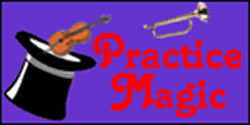
Since 1985
In the quiet beauty of upstate NY
"intimate. collegial. challenging"
After 30 years of witnessing thousands of musicians practice, one attitude emerges as dominant. Most musicians act and react in their practicing with an unreasonable urge to produce a performance-ready result TODAY. This is not a conscious decision. It is the result of a major flaw in instrumental pedagogy. Musicians are not usually taught explicitly how to coach themselves to maximize the results of their effort.
In order to practice effectively you must be in control of your conscious and unconscious expectations. Most of us don't distinguish between them. Unconscious expectations often manifest themselves as impulsive and unreasonable demands for achievement before it is possible. ["After ten minutes of practice, I can't believe that I still lose control in measure three."] Unconscious expectations can be controlled by replacing them with informed conscious strategies that produce satisfying results. A collection of such practicing strategies would constitute a pedagogy of practicing. This practicing pedagogy is currently evolving (see the internet.) It will be many years before it has become standard. As this information becomes available, it will empower musicians to develop solutions to problems as they arise, to coach themselves effectively.
I call my blog "Practice Magic" to highlight the reassuring effects of consciously guiding your practice with tested strategies that promote realistic expectations. Practicing in this informed way often feels like "magic." Suddenly anxiety is diminished, frustration is relieved and an overloaded mind experiences what is, at its best, a transcendental serenity.
In the 21st century the neurosciences are evolving to describe how mind, brain and body coordinate to cause both our conscious and unconscious behavior. This expanding horizon is yielding insights which can empower musicians to coach themselves to practice effectively. My book, "Practicing for Artistic Success – The Musician's Guide to Self-Empowerment" is a collection of these strategies. In my blog, I will continue to reveal insights and strategies which musicians can employ as they practice to improve their coordination of rhythm, tone and pitch to form and communicate meaningful musical interpretations.
New blog posts will appear regularly. Below is a list of forthcoming topics.
Register here to be notified when my blog goes live and help to identify the topics you'd prefer.
On The Process of Practicing
What isn't automatic needs work; what is automatic needs trust.
Work with your attention, not with your muscles.
Lose time to gain time; follow the path, not the product.
Do not constrain the events of today by an anticipation of tomorrow.
The tension in your body should not climax before the tension in the sound.
On Intonation
Excellent intonation - more a problem of tone than pitch.
A pragmatic approach to intonation control: If one note in a pattern of notes is out of tune, all the notes in the pattern are out of tune.
The effect of rhythm on control of intonation.
The effect of tone on control of intonation.
Stages in the development of excellent intonation.
Harmonic intonation / Melodic intonation.
Other Topics
Excellent coordination is always an issue of Three Hands.
Technique as athletics; Technique as music.
Music is a technique of passion.
Emotion is the glue that binds all the pieces together.
Tricks to developing reflexive technical control.
The Body's Energy should modulate continuously with the infinity of changes in the musical flow.
Relaxation is only a point of reference from which to evolve a precise and emotionally penetrating tautness.

